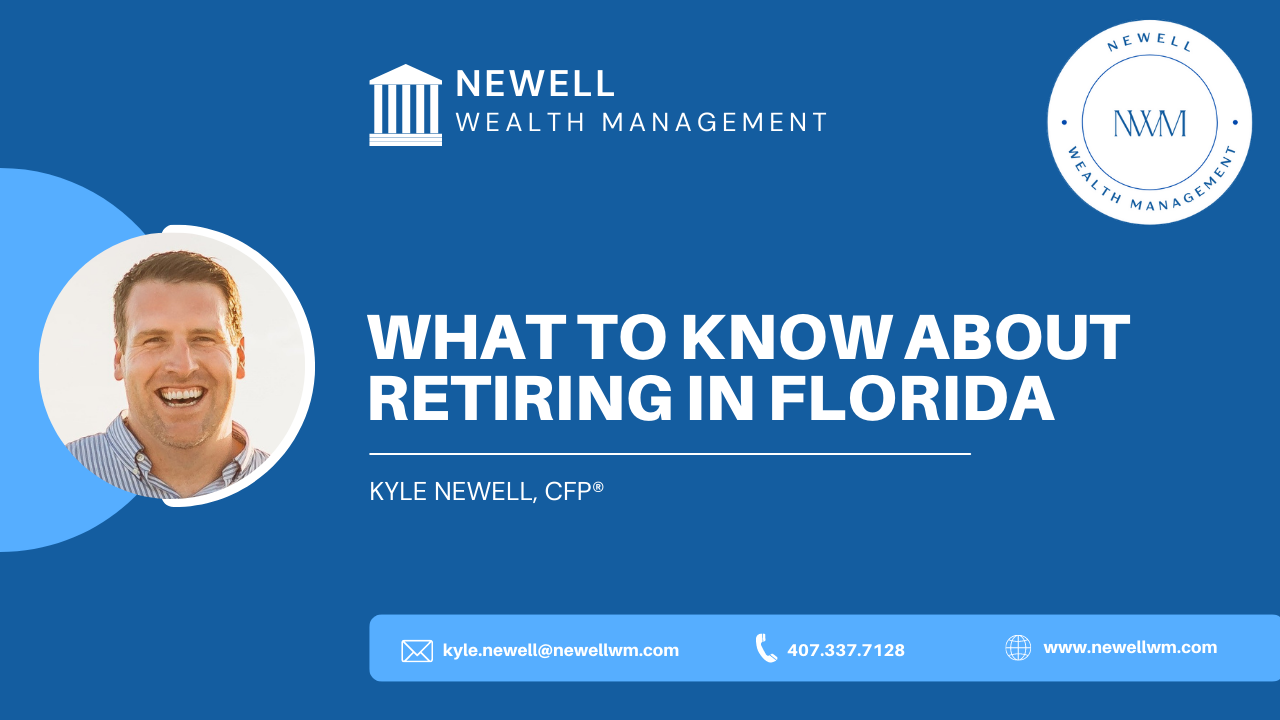What to Know About Retiring in Florida

Florida is a hotspot for retirees. We have thousands if not hundreds of thousands, of people regularly retiring to various places in Florida.
It’s no surprise why.
- The weather is nice
- There are no state income taxes
- Several major airports make it easy to travel
Also, the cost of living in Florida is relatively low. It has increased recently, primarily with housing, because of the demand from the number of people moving into Florida from all over the country.

Some come for vacation. Some come for a season. But, if you’re planning to retire to Florida, there are a few things you need to know for your retirement and financial planning.
Taxation
Let’s start with looking at taxes. One of the obvious benefits of living in Florida is that there is no state income tax. However, without a state income tax, there are other sources of taxes to consider when making your financial plans for retiring in Florida.
Property Tax
One of the most significant is property tax. Property taxes in Florida are typically higher than in many other parts of the country simply because there’s no income tax. Money has to come from somewhere, which means things like property are taxed higher to compensate.
Municipal Bonds
If you are a holder of municipal bonds, that is one major benefit of an investment strategy when investing in Florida. Depending on the state you are coming from, you may have only been able to invest in municipal bonds of the state you were living in.
Since there’s no state income tax in Florida, you get that double taxation-free benefit of municipal bonds. This allows you to invest in municipal bonds not only in Florida but in many other places as well. This can help provide some diversification for your investment portfolio.
Estate Planning
The second thing to think about when retiring to Florida is estate planning. Every state has its own laws for handling estates. You need to know how the laws work for managing the passing of your assets to your beneficiaries when you pass away.
Aside from assets, it also includes decisions around power of attorney and making financial decisions if you cannot do so yourself. Florida law is different from other states. Depending on where you came from, you may need to update your estate plans.
Estate plans typically hold one or more of the following.
Trust
There are two types of trusts. A revocable trust can be changed throughout your lifetime. Irrevocable trusts cannot be changed. You may need to consider the type of trust you have and adjust it appropriately.
Will
A will tells your estate, or the executor, what should be done with or how to distribute your assets after your lifetime.
Power of Attorney
In Florida, having a power of attorney is of particular necessity. Even if you’re married, your spouse would need power of attorney to do any financial transaction on your behalf.
Knowing you may need a durable power of attorney for you and your spouse is crucial for estate planning and retiring in Florida. This is different than many other states. Many people coming from states with different laws do not update or put this in place. When they pass, their survivors may have a lot to deal with to rectify it.
No one wants to think about dying, but it is inevitable. Plan for it. Make sure your plans are in order to transfer wealth easily without burdening your family. Allow your family to have the ability to make decisions on your behalf if you’re unable to do so.
Retiring in Florida means understanding the laws of Florida. Working with an attorney to set it all up is pivotal. Not only for having the proper documents in place. It’s also for making sure you have plans to help facilitate using those documents. It’s imperative that everyone is on the same page, understands the expectations, and can follow through.
Insurance
Florida has different risks than other parts of the country. One of the primary ones is hurricanes. When it comes to homeowners insurance, there are often additional premiums for hurricane coverage or damage related to hurricanes. You may also be required to have flood insurance if your home is in a flood zone. Floods are not always hurricane-related. They can happen with heavy rain, which occurs in Florida during certain seasons. These rains can cause water to rise and flood your home.
Sometimes, people try to do insurance in a “DIY” way to try and save money. They try to cut out certain “extra” coverages. If you work with an insurance broker in Florida, they will typically be able to guide you through all of the specific coverages needed for your home.
You want to be vigilant about the insurance coverage you choose for your home. Include everything you need. If you don’t, you could end up with pretty substantial costs if you end up with hurricane damage. Hurricane damage deductibles are different than for other claims. Floods may not even be covered under your regular home insurance.
You need to be careful with possible risks you may be exposed to in your home insurance purchases. Mitigate the risks as best you can by having the proper insurance in place.
Plan with Purpose
There are many benefits to retiring in Florida, including no income tax and lower costs of living. Still, retiring in Florida does require understanding the nuances of the state.
Don’t overlook the importance of
- Taxation
- Estate planning for Florida laws
- Insurance coverages
Relax and admire Florida’s beautiful sunsets with proper retirement and financial planning in your sunset years. If you would like guidance from an experienced financial planner in Florida, I’m happy to help.
Important Information
Newell Wealth Management, LLC (“NWM”) is a registered investment advisor offering advisory services in the State of FL and in other jurisdictions where exempted. Registration does not imply a certain level of skill or training. The presence of this website on the Internet shall not be directly or indirectly interpreted as a solicitation of investment advisory services to persons of another jurisdiction unless otherwise permitted by statute. Follow-up or individualized responses to consumers in a particular state by NWM in the rendering of personalized investment advice for compensation shall not be made without our first complying with jurisdiction requirements or pursuant to an applicable state exemption.
All written content on this site is for information purposes only and is not intended to provide specific advice or recommendations for any individual. Opinions expressed herein are solely those of NWM, unless otherwise specifically cited. Kyle Newell and NWM are neither an attorney nor an accountant, and no portion of this website content should be interpreted as legal, accounting, or tax advice. Material presented is believed to be from reliable sources, and no representations are made by our firm as to other parties’ informational accuracy or completeness. There is no assurance that the views or strategies discussed are suitable for all investors or will yield positive outcomes. Investment involves risks including possible loss of principal and unless otherwise stated, are not guaranteed. Any economic forecasts set forth may not develop as predicted and are subject to change. All information or ideas provided should be discussed in detail with an advisor, accountant, or legal counsel prior to implementation.
